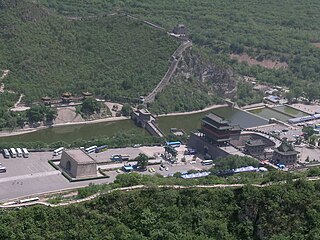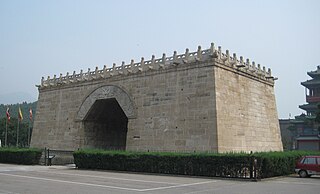The Uyghurs or Uighurs, are a Turkic people who live in Central and East Asia. As of 2019, Uyghurs live primarily in the Xinjiang Uyghur Autonomous Region of the People’s Republic of China, where they are one of China's fifty-five officially-recognized ethnic minorities. Uyghurs primarily practice Islam.

Many alphabets have been devised for the Mongolian language over the centuries, and from a variety of scripts. The oldest, called simply the Mongolian script, has been the predominant script during most of Mongolian history, and is still in active use today in the Inner Mongolia region of China and de facto use in Mongolia. It has spawned several alphabets, either as attempts to fix its perceived shortcomings, or to allow the notation of other languages, such as Sanskrit and Tibetan. In the 20th century, Mongolia first switched to the Latin script, and then almost immediately replaced it with the Cyrillic script for compatibility with the Soviet Union, its political ally of the time. Mongol Chinese in Inner Mongolia and other parts of China, on the other hand, continue to use alphabets based on the traditional Mongolian script.

The languages of China are the languages that are spoken in China. The predominant language in China, which is divided into seven major language groups, is known as Hanyu and its study is considered a distinct academic discipline in China. Hanyu, or Han language, spans eight primary varieties, that differ from each other morphologically and phonetically to such a degree that they will often be mutually unintelligible, similarly to English and German or Danish. The languages most studied and supported by the state include Chinese, Mongolian, Tibetan, Uyghur and Zhuang. China has 299 living languages listed at Ethnologue. According to the 2010 edition of the Nationalencyklopedin, 955 million out of China's then-population of 1.34 billion spoke some variety of Mandarin Chinese as their first language, accounting for 71% of the country's population.

The Uyghur or Uighur language, formerly known as Eastern Turki, is a Turkic language with 10 to 15 million speakers, spoken primarily by the Uyghur people in the Xinjiang Uyghur Autonomous Region of Western China. Significant communities of Uyghur-speakers are located in Kazakhstan, Kyrgyzstan and Uzbekistan, and various other countries have Uyghur-speaking expatriate communities. Uyghur is an official language of the Xinjiang Uyghur Autonomous Region, and is widely used in both social and official spheres, as well as in print, radio, and television, and is used as a common language by other ethnic minorities in Xinjiang.
Dao Lang is the stage name of Luo Lin, a Chinese singer from Sichuan, China.

The Chinese Wikipedia is the (Standard) Chinese language edition of Wikipedia. It is run by the Wikimedia Foundation. Started on 11 May 2001, the Chinese Wikipedia currently has about 1,051,000 articles and about 2,717,000 registered users, of which 81 have administrative privileges. The Chinese Wikipedia has been blocked in Mainland China since May 2015.

Rebiya Kadeer is an ethnic Uyghur, businesswoman, and political activist. Born in city of Altay of China, Kadeer became a millionaire in the 1980s through her real estate holdings and ownership of a multinational conglomerate. Kadeer held various positions in China's parliament and other political institutions before being arrested in 1999 for, according to Chinese state media, sending confidential internal reference reports to her husband, who worked in the United States as a pro-East Turkistan independence broadcaster. After she fled to the United States in 2005 on compassionate release, Kadeer assumed leadership positions in overseas Uyghur organizations such as the World Uyghur Congress. Kadeer speaks Uyghur and Mandarin Chinese.

Taoyuan County is under the administration of Changde, Hunan Province, China. The Yuan River, a tributary of the Yangtze, flows through Taoyuan. It covers an area of 4441 square kilometers, of which 895 km2 (346 sq mi) is arable land. It is 229 km (142 mi) from Zhangjiang Town, the county seat, to Changsha, the capital city of Hunan province. The county occupies the southwestern corner of Changde City and borders the prefecture-level cities of Zhangjiajie to the northwest and Huaihua to the southwest.
Wang Luobin was a Chinese songwriter. He specialized in publishing Mandarin-language songs based on the music of various ethnic minorities in western China.

Juyong Pass is a mountain pass located in the Changping District of Beijing Municipality, over 50 kilometers (31 mi) from central Beijing. The Great Wall of China passes through, and the Cloud Platform was built here in the year 1342.

The recorded history of the area now known as Xinjiang dates to the 2nd millennium BC. There have been many empires, primarily Han Chinese, Turkic, and Mongol, that have ruled over the region, including the Yuezhi, Xiongnu, Han dynasty, Gaochang, Kingdom of Khotan, Sixteen Kingdoms of the Jin dynasty, Turkic Khaganate, Tang dynasty, Tibetan Empire, Uyghur Khaganate, Kara-Khanid Khanate, Kingdom of Qocho, Qara Khitai, Mongol Empire, Yuan dynasty, Chagatai Khanate, Yarkent Khanate, Dzungar Khanate, and Qing dynasty. Xinjiang was previously known as "Xiyu", under the Han dynasty, which drove the Xiongnu empire out of the region in 60 BCE in an effort to secure the profitable Silk Road, but was renamed Xinjiang when the region was reconquered by the Manchu-led Qing dynasty in 1759. Xinjiang is now a part of the People's Republic of China, having been so since its founding year of 1949.

The Encyclopedia of China is the first large-entry modern encyclopedia in the Chinese language. The compilation began in 1978. Published by the Encyclopedia of China Publishing House, the encyclopedia was issued one volume at a time, beginning in 1980 with a volume on astronomy; the final volume was completed in 1993. It comprised 74 volumes, with more than 80,000 entries. Arranged by subject, which numbered 66, within each subject, entries were arranged by pinyin as many modern Chinese dictionaries have been. A Uyghur language edition was also published in 2015.
The Girl from Dabancheng is a well known folk song with Chinese lyric translated by Wang Luobin, and adapted from the Uyghur folksong Qamberxan. One of the early recordings of the song Qamberxan was done by a German ethnomusicologist on the singing of a Turpan Taranchi farmer's 16-year-old daughter. The song was most likely composed by an Uyghur soldier back in the time of Yaqub Beg, when the soldier was posted from southern Xinjiang to the north (Ili) or east (Turpan). Indeed, there are many songs dated back that time associated with a soldier's courtship, such as Havagul, which talks about a girl in Ili. However, Qamberxan talks about a girl in Dabancheng which lies between Turpan and Urumqi, and is a district of Urumqi. This district is well known as an entrepot on inter-oasis travel. The reputation of the beauty of local girls is partly due to the mixing among the different populations that traveled through it.
"Zai Na Yaoyuan De Difang" is the title and first line of a popular Chinese song by Wang Luobin, the renowned Chinese songwriter and ethnic music researcher.

The Cloud Platform at Juyongguan is a mid-14th-century architectural feature situated in the Guangou Valley at the Juyongguan Pass of the Great Wall of China, in the Changping District of Beijing Municipality, about 60 kilometres (37 mi) northwest of central Beijing. Although the structure looks like a gateway, it was originally the base for three white dagobas or stupas, with a passage through it, a type of structure known as a "crossing street tower". The platform is renowned for its Buddhist carvings and for its Buddhist inscriptions in six languages. The Cloud Platform was the 98th site included in the first batch of 180 Major Historical and Cultural Sites Protected at the National Level as designated by the State Council of China in April 1961.

Qocho, also known as Idiqut, was an Uyghur Turkic kingdom created in 843, with Buddhist and Tocharian influences.

The Voice of the Silk Road is a Chinese reality talent show based in Xinjiang and broadcast in the Uyghur language. The television show airs regularly on Xinjiang Television Channel 9. The show is recorded at the Xinjiang Arts Institute Concert Hall.
Tianshan Snow Lotus Group is an Uyhghur music group specializing in a fusion of music styles that integrates traditional Uyghur classical, Latin, Arabic, Turkish, European, and pop music. They are particularly noted for their unique music style, brisk pace, dance on stage, and charismatic performances.

Re-education camps is a title given to the internment camps operated by the People's Republic of China Xinjiang Uyghur Autonomous Region's government since 2014. They have unprecedentedly intensified since a hardline party secretary, Chen Quanguo, took charge of the region in August 2016. These camps are reportedly operated secretly and outside of the legal system; many Uyghurs have been locked up without any trial or charges being levied. Local authorities are reportedly holding hundreds of thousands of Uyghurs and Muslims from other ethnic minorities in these camps, claiming the detentions are a bid to counter extremism and terrorism.
In May 2014, China launched the "Strike Hard Campaign against Violent Terrorism" in the far west province of Xinjiang. It is an aspect of the Xinjiang conflict, the ongoing struggle by the Chinese government to effectively manage the ethnically diverse and tumultuous province. This campaign has been credited as effectively giving the state broad latitude to punish and control Muslim Uyghurs based on their religious identities. China has used the global “war on terror” of the 2000s to frame separatist and ethnic unrest into acts of Islamist terrorism to legitimize increasingly repressive counter-insurgency policies in Xinjiang. One element of this campaign has been the jailing of nearly one million Uyghurs in Xinjiang's re-education camps. Chinese officials have maintained that the campaign is essential for national security purposes.














